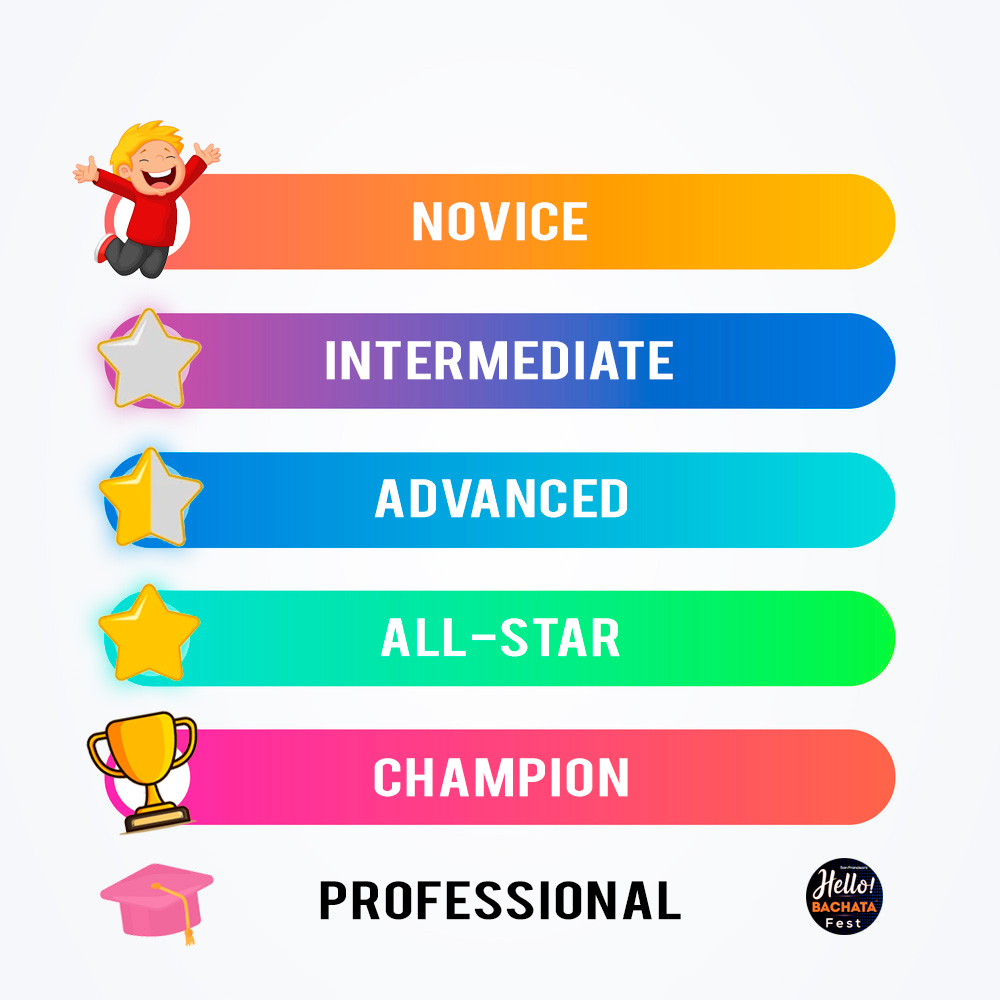
Hello Bachata Fest 2025 J&J Competition
Closed for 2025
No competition for 2025.
No competition for 2025.
Registration Fee: N/A*
* Full event pass must be purchased to enter.
! The competition can only commence once minimum registrations are met. Please read here.
Genres:
- Sensual/Urban
- Dominican
- Dominican
Divisions:
- Open Level
Hyatt Regency SF Airport
1333 Bayshore Highway
Burlingame, CA
Table of Contents

What is a Jack & Jill Competition?
A Jack & Jill dance competition is a type of partner dance competition originating from the swing dance community. In the present day, this type of competition is found in many dance genres including Bachata.
The distinguishing feature of a Jack & Jill competition is that dancers are randomly paired with a partner just before they perform, which means they don't have the opportunity to rehearse or plan their routine with a specific partner.
Jack & Jill competitions are popular for several reasons:
How Our Competition Works

Purchase the full event pass. Then pay the $35 registration fee.* Then pick up your competition wristband at the registration counter on event weekend.
* $40 if you wait to register in-person.
* $40 if you wait to register in-person.
2. Pre-Qualification
Those that have pre-paid will receive an email with a form to complete within four weeks of the competition. This will ensure your eligibility for the division you are competing in and speed up your check-in process before the competition.*
* Ensure that the correct email is used when you registered with $35. Although 2025 will offer the Open Level Division, completion of of your form will be used for analytical purposes.
* Ensure that the correct email is used when you registered with $35. Although 2025 will offer the Open Level Division, completion of of your form will be used for analytical purposes.
3. Arrive to Compete
Be present to compete on Saturday July 26 for preliminaries. See schedule for location.*
* Those that did not fill out the pre-qualification form will be asked to do so.
You must have your competition wristband to compete.
* Those that did not fill out the pre-qualification form will be asked to do so.
You must have your competition wristband to compete.
4. Select Role and Skill
Indicate your role (lead or follow) and select your level (novice or intermediate).*
* A representative will review your pre-qualification form to confirm you meet the eligibility requirements for the division you are competing in.
* A representative will review your pre-qualification form to confirm you meet the eligibility requirements for the division you are competing in.
5. Assign Bib Number
Those competing in novice and intermediate will be assigned a bib number. If you had previously participated in a qualification round and have been issued a bib number you will be re-issued the same number.*
* Competitors are responsible for knowing their bib number if they have been issued one prior to the competition. Ensure you provide your bib number in the pre-qualification form.
* Competitors are responsible for knowing their bib number if they have been issued one prior to the competition. Ensure you provide your bib number in the pre-qualification form.
6. Preliminary Round
For each division (novice and intermediate), everyone competes in this round. Organizers randomly pair leads and follows. This is usually done in a way that ensures a good mix of skill levels and dance experience.
Dancers with the top scores will move on to compete in the finals on Sunday July 27.*
* Depending on how many competitors there are and the size of the dance floor, multiple heats may be employed. Up to three rounds may be employed per heat.
Dancers with the top scores will move on to compete in the finals on Sunday July 27.*
* Depending on how many competitors there are and the size of the dance floor, multiple heats may be employed. Up to three rounds may be employed per heat.
7. Finals Round
For each level (novice and intermediate), competitors will all draw cards to choose a partner with whom they will dance the rest of the round.
Couples take the floor one by one, and they dance to music by the competition organizers. Dancers are judged on their ability to adapt to their randomly assigned partner, their musicality, and their overall dancing skills.
Competitors that score the highest win.
Couples take the floor one by one, and they dance to music by the competition organizers. Dancers are judged on their ability to adapt to their randomly assigned partner, their musicality, and their overall dancing skills.
Competitors that score the highest win.
Divisions
In our Bachata jack and jill competition you may see the following divisions:

Bachata Jack & Jill Dance Competition Rules
1. Eligibility:
a. Eligible participants must be at least 18 years old to compete (unless it is Open Level).
b. Open Level: Open to all dancers regardless of age, dance experience, teaching experience, ranking score, and whether they are teaching at our festival.
c. Novice: A maximum of two years of dancing experience in Bachata is required to be eligible to participate in novice.
d. Novice: This competition is an open to all dancers and who have not received compensation for teaching dance, including instruction provided for profit, within the past 15 years prior to the competition date.
e. Novice: Dance instructors, professional dance teachers, and individuals who have received compensation for teaching dance within the past 15 years prior to the competition date are ineligible to participate in novice.
f. Novice: Dancers who have never competed in a registered competition by Hello Bachata or have a novice ranking score of 20 or less, are eligible to participate in novice.
g. Intermediate: A minimum of two years dancing experience in Bachata is required to be eligible to participate in intermediate.
h. Intermediate: This competition is open to dance instructors, dance teachers, and individuals who have received compensation for teaching dance less than 25 times per calendar year in the last 15 years prior to competition date.
i. Intermediate: Dancers that feel they are over-experienced for the novice division, have not been ranked as an intermediate, and have had a minimum of two years of dancing experience in Bachata, are eligible to participate in intermediate.
j. Intermediate: Dance instructors who are teaching workshops at our festival and are receiving compensation for teaching at our festival are ineligible to participate in intermediate.
k. Intermediate: Dance instructors, professional dance teachers, and individuals who teach more than 25 times per calendar year in the past 15 years prior to competition date, are inelegible to participate in intermediate.
l. Intermediate: Dancers who have participated in our qualification events and have scored 20 or more points in the novice division are eligible to participate in intermediate.
m. Intermediate: Dancers who are not dance instructors or professional dance teachers, who have been dancing Bachata for 15 or more years are ineligible to compete in intermediate.
b. Open Level: Open to all dancers regardless of age, dance experience, teaching experience, ranking score, and whether they are teaching at our festival.
c. Novice: A maximum of two years of dancing experience in Bachata is required to be eligible to participate in novice.
d. Novice: This competition is an open to all dancers and who have not received compensation for teaching dance, including instruction provided for profit, within the past 15 years prior to the competition date.
e. Novice: Dance instructors, professional dance teachers, and individuals who have received compensation for teaching dance within the past 15 years prior to the competition date are ineligible to participate in novice.
f. Novice: Dancers who have never competed in a registered competition by Hello Bachata or have a novice ranking score of 20 or less, are eligible to participate in novice.
g. Intermediate: A minimum of two years dancing experience in Bachata is required to be eligible to participate in intermediate.
h. Intermediate: This competition is open to dance instructors, dance teachers, and individuals who have received compensation for teaching dance less than 25 times per calendar year in the last 15 years prior to competition date.
i. Intermediate: Dancers that feel they are over-experienced for the novice division, have not been ranked as an intermediate, and have had a minimum of two years of dancing experience in Bachata, are eligible to participate in intermediate.
j. Intermediate: Dance instructors who are teaching workshops at our festival and are receiving compensation for teaching at our festival are ineligible to participate in intermediate.
k. Intermediate: Dance instructors, professional dance teachers, and individuals who teach more than 25 times per calendar year in the past 15 years prior to competition date, are inelegible to participate in intermediate.
l. Intermediate: Dancers who have participated in our qualification events and have scored 20 or more points in the novice division are eligible to participate in intermediate.
m. Intermediate: Dancers who are not dance instructors or professional dance teachers, who have been dancing Bachata for 15 or more years are ineligible to compete in intermediate.
2. Registration:
a. All participants must register in advance of the competition. Registration will be open until 1 minute before preliminaries start.
b. For all competition divisions, the leaders shall be men and the followers shall be women, unless it is stated as a non-traditional division.
c. Participants must provide accurate information regarding their dance experience and teaching history when registering.
d. Registrants will be required to sign a statement of eligibility affirming that they meet the competition's eligibility criteria.
e. Registrants will be required to complete a pre-qualification form affirming that they meet the competition's eligibility criteria.
b. For all competition divisions, the leaders shall be men and the followers shall be women, unless it is stated as a non-traditional division.
c. Participants must provide accurate information regarding their dance experience and teaching history when registering.
d. Registrants will be required to sign a statement of eligibility affirming that they meet the competition's eligibility criteria.
e. Registrants will be required to complete a pre-qualification form affirming that they meet the competition's eligibility criteria.
3. Dance Divisions:
a. The competition will consist of Open level, novice, and intermediate divisions and judged on dancing the following styles: Sensual/Urban and Dominican Bachata. For 2025 only the Open Level division will be available.
4. Random Partner Selection (Jack & Jill Format):
a. Dancers will be randomly paired with different partners for each round of the competition. Partner assignments will be made just before each round begins.
5. Judging:
a. Competitors will be judged on their timing & musicality, technique, teamwork, difficulty (N/A for 2025), appearance (N/A for 2025), and overall performance.
b. Judges will not have prior knowledge of the contestants' teaching history to ensure a fair competition.
c. If a competitor has placed in the finals and later determined to have falsified their dance experience and/or teaching experience during registration, the competitor will receive a 0 in their regional, national, and/or world ranking. If prizes were awarded to the competitor, prizes must be returned or else be automatically disqualified from any future competition and receive a permanent DISQUALIFIED score in their regional, national, and/or world ranking.
b. Judges will not have prior knowledge of the contestants' teaching history to ensure a fair competition.
c. If a competitor has placed in the finals and later determined to have falsified their dance experience and/or teaching experience during registration, the competitor will receive a 0 in their regional, national, and/or world ranking. If prizes were awarded to the competitor, prizes must be returned or else be automatically disqualified from any future competition and receive a permanent DISQUALIFIED score in their regional, national, and/or world ranking.
6. Music:
a. The competition will use a variety of music genres, including Sensual/Urban and Dominican.
b. Songs and music selection will be at the discretion of the competition organizers.
c. Each round will have music played for two minutes with an even and uninterrupted transition from Sensual/Urban music to Dominican. Up to three rounds can be employed per heat.
b. Songs and music selection will be at the discretion of the competition organizers.
c. Each round will have music played for two minutes with an even and uninterrupted transition from Sensual/Urban music to Dominican. Up to three rounds can be employed per heat.
7. Lifts and Dips:
a. Lifts: A lift is when both feet of one
partner leave the floor and the partner’s weight is supported. These are not permitted and will result in an immediate disqualification in any division.
b. Dips: Are permitted for as long as one foot of each partner remains on the ground.
b. Dips: Are permitted for as long as one foot of each partner remains on the ground.
8. Attire:
a. Participants should wear appropriate dance attire and shoes suitable for the style of dance they are performing.
b. Participants are encouraged to dress in attire that they would normally have on during a social dance. You will not be penalized for dressing in sweatpants, gym attire, track suits, yoga attire, and the such but your Appearance score could be affected.
c. Props are not permitted. A prop is any object or detachable piece of clothing that is used intentionally as part of the dance.
d. Follows are encouraged to wear heels as the added level of difficulty reflects in your difficulty score. You will not be penalized for wearing flats.
e. Leaders do not get a point bonus for high heels because the leader is expected to be grounded and ready to stabilize the follow following a complicated moment.
b. Participants are encouraged to dress in attire that they would normally have on during a social dance. You will not be penalized for dressing in sweatpants, gym attire, track suits, yoga attire, and the such but your Appearance score could be affected.
c. Props are not permitted. A prop is any object or detachable piece of clothing that is used intentionally as part of the dance.
d. Follows are encouraged to wear heels as the added level of difficulty reflects in your difficulty score. You will not be penalized for wearing flats.
e. Leaders do not get a point bonus for high heels because the leader is expected to be grounded and ready to stabilize the follow following a complicated moment.
9. BIB Placement
a. Leaders: Bib should be attached with safety pins on the back between the shoulder blades.
b. Followers: Bib should be attached with safety pins on the lower back or just over the butt.
c. Bibs cannot be placed on the front or side of the body.
d. Bib numbers are used for the open level, novice, and intermediate divisions.
b. Followers: Bib should be attached with safety pins on the lower back or just over the butt.
c. Bibs cannot be placed on the front or side of the body.
d. Bib numbers are used for the open level, novice, and intermediate divisions.
10. Prizes:
a. Prizes will be awarded to the top performers in each category. Prizes may include medals, festival passes, and cash. Festival passes are non-transferable.
b. Cash prizes and festival passes are given to the division winners after the last day of the weekend festival but within 30 days.
c. Winners will be verified through background checks, social media checks, and peer verification to ensure that they were eligible to compete in each division. If a winner has been identified to have been ineligible but competed and won, the prizes will not be awarded and the dancer will be automatically disqualified from any future competition certified by Hello Bachata Fest. They will then receive a permanent DISQUALIFIED score in their regional, national, or world ranking. If within 30 days the winner(s) are confirmed as eligible, prizes will be given out to the winner(s).
c. Cash prizes are awarded to the winning leader and follower for 1st, 2nd, and 3rd rankings in intermediate and novice divisions. For example $1,000 USD for first place intermediate division would split between the leader and the follower ($500 each). Second place of $500 would split between the leader and follower ($250 each) and so forth.
d. Prizes are given out based on the number of competitors for each division. The number of competitors reflects the level of difficulty. Please see Competition Legitimacy for prize breakdown.
b. Cash prizes and festival passes are given to the division winners after the last day of the weekend festival but within 30 days.
c. Winners will be verified through background checks, social media checks, and peer verification to ensure that they were eligible to compete in each division. If a winner has been identified to have been ineligible but competed and won, the prizes will not be awarded and the dancer will be automatically disqualified from any future competition certified by Hello Bachata Fest. They will then receive a permanent DISQUALIFIED score in their regional, national, or world ranking. If within 30 days the winner(s) are confirmed as eligible, prizes will be given out to the winner(s).
c. Cash prizes are awarded to the winning leader and follower for 1st, 2nd, and 3rd rankings in intermediate and novice divisions. For example $1,000 USD for first place intermediate division would split between the leader and the follower ($500 each). Second place of $500 would split between the leader and follower ($250 each) and so forth.
d. Prizes are given out based on the number of competitors for each division. The number of competitors reflects the level of difficulty. Please see Competition Legitimacy for prize breakdown.
11. Refund Policy:
a. Dancers who have registered by paying the entry fee are assumed to have read and established if they meet the rules and eligibility requirements for each division.
b. If you have been determined through pre-qualification that you are not eligible for any division, registration fee will not be refunded.
c. No refunds if you have competed and did not rank or place in the top 5.
d. No refunds if you have competed and ranked in the top 5.
e. Refunds are issued if the competition does not meet legitimacy.
f. Event Terms & Conditions are applicable to dancers that compete.
b. If you have been determined through pre-qualification that you are not eligible for any division, registration fee will not be refunded.
c. No refunds if you have competed and did not rank or place in the top 5.
d. No refunds if you have competed and ranked in the top 5.
e. Refunds are issued if the competition does not meet legitimacy.
f. Event Terms & Conditions are applicable to dancers that compete.
12. Code of Conduct:
a. All participants are expected to display sportsmanship and respect towards their fellow competitors, judges, and event staff.
b. Any disruptive behavior, cheating, or violation of the competition rules may result in disqualification.
b. Any disruptive behavior, cheating, or violation of the competition rules may result in disqualification.
13. Organizers' Discretion:
a. The competition organizers reserve the right to make final decisions on any matters not explicitly covered in these rules.
14. Waiver:
a. All participants must sign a waiver indicating their understanding and acceptance of these rules and the inherent risks associated with dance competitions.
By following these rules, your Bachata Jack & Jill dance competition can ensure a level playing field and maintain the spirit of fair competition among amateur dancers.
By following these rules, your Bachata Jack & Jill dance competition can ensure a level playing field and maintain the spirit of fair competition among amateur dancers.
Competition Legitimacy
Certain minimums must be met before the competition can take place.
From this point on Hello Bachata Fest will be referenced as HBF.
1. Division Minimum
a. The festival must offer a minimum of one division for contestants to compete in.
b. HBF will offer only the Open Level division for 2025.
c. A minimum of 5 couples (5 leaders and 5 followers) must participate in each division for the division competition to be legitimate. If the minimum number of competitors is not met the competition is forfeit and refunds will be issued.
b. HBF will offer only the Open Level division for 2025.
c. A minimum of 5 couples (5 leaders and 5 followers) must participate in each division for the division competition to be legitimate. If the minimum number of competitors is not met the competition is forfeit and refunds will be issued.
2. Competitor Minimum
a. For 2025, A minimum of 10 total competitors must be registered to compete across any number of divisions offered. For 2026 the minimum raises to 20 total.
b. This is a traditional competition where leaders are men and followers are women.
b. This is a traditional competition where leaders are men and followers are women.
3. Scoring
The Bachata Dance Judging Committee (BDJC) records and tracks points for Novice, Intermediate, and Advance divisions. Points are tracked based on tiers which is determined by number of competitors in each division:
i. Tier 1 = 5-15 Couples (5 to 1 points)
ii. Tier 2 = 16-39 Couples (10 to 2 points)
iii. Tier 3 = 40+ Couples (15 to 6 points)
i. Tier 1 = 5-15 Couples (5 to 1 points)
ii. Tier 2 = 16-39 Couples (10 to 2 points)
iii. Tier 3 = 40+ Couples (15 to 6 points)
4. Competitor Experience
a. Competitors must meet the eligibility requirements set forth above for the divisions that are available for contestants to enter.
5. Competitor Registration
a. Competitors must register by the start of preliminaries which July 26, 11:00 AM PST.
b. Same day, weekend, or late registrants will be accepted for a $40 registration fee.
c. All competitors are required to complete their pre-qualification form to ensure competitors are eligible for the division they are competing in. Since 2025 will offer only the Open Level division, completion of the form will be used for analytical purposes, and will not be used to penalize the competitor.
b. Same day, weekend, or late registrants will be accepted for a $40 registration fee.
c. All competitors are required to complete their pre-qualification form to ensure competitors are eligible for the division they are competing in. Since 2025 will offer only the Open Level division, completion of the form will be used for analytical purposes, and will not be used to penalize the competitor.
6. Prizes
a. Prizes are given out to competitors who have placed and ranked in 1st, 2nd, and third place for every division offered by HBF.
b. Prize amount and type are given out based on the number of competitors in each division:
i. 5+ Couples, Open Level Division: $500 / Festival Full Pass / Festival Full Pass
ii. 40+ Couples, Intermediate Division: $1,000 / $500 / $250
iii. 40+ Couples, Novice Division: $500 / $250 / $125
iv. 16-39 Couples, Intermediate Division: $500 / $250 / $125
v. 16-38 Couples, Novice Division: Festival Full Passes for a future festival
vi. 5-15 Couples, Intermediate Division: Festival Full Passes for a future festival
vii. 5-15 Couples, Novice Division: Festival Full Passes for a future festival
b. Prize amount and type are given out based on the number of competitors in each division:
i. 5+ Couples, Open Level Division: $500 / Festival Full Pass / Festival Full Pass
ii. 40+ Couples, Intermediate Division: $1,000 / $500 / $250
iii. 40+ Couples, Novice Division: $500 / $250 / $125
iv. 16-39 Couples, Intermediate Division: $500 / $250 / $125
v. 16-38 Couples, Novice Division: Festival Full Passes for a future festival
vi. 5-15 Couples, Intermediate Division: Festival Full Passes for a future festival
vii. 5-15 Couples, Novice Division: Festival Full Passes for a future festival

Winners
Prizes are awarded to the winning competing leaders and followers for each place. Awards Ceremony takes place Sunday night during performances. The following are prizes for Tier 3 Scoring and may not reflect the actual prize during competition day:
Open Level 1st Place
Two Trophies + $500 USD + Score Ranking
Open Level 2nd Place
Two Festival Passes + Score Ranking
Open Level 3rd Place
Two Festival Passes + Score Ranking
What You'll Be Judged On
A panel of judges evaluates each couple's performance, considering five factors:
The following is a detailed breakdown of each factor:
- Popular
- Full Pass
- $205
- Fri, Sat, Sun
- Bachata, Salsa, Kizomba, and Zouk
- Dancing up 'til 7:00am
- All Day Workshops
- Day Parties
- Performance Showcases
- PreParty
- Buy Pass Now
- Bachata Master Class
- +$100
- Addon
- Exclusive Sensual Bachata workshop with Spain's Klau & Ros.
- Sunday 5-6pm
- 1-Hour Intensive
- For all-levels
- Limited to 10 Leaders
- Limited to 10 Followers
- Full pass required
- Zouk Competition
- +$25
- Addon
- Zouk Jack & Jill competition to see who's the best among their peers.
- Saturday 7-9pm
- Sunday 7-9pm
- Divisions: Novice and Intermediate
- Full Pass Purchase Required
- PreParty
- Thursday Pre-Party
- $20
- Addon
- More memories with dancing at the venue before the official weekend festival!
- 10pm - 3am
- 2 Rooms: Bachata & Salsa, and Zouk
- Some Int'l Artists Expected
- Presales End 12:00pm Day-of
- Instructor Training
- +$799
- Fri, Sat, Sun
- Become the best version of yourself through this training and certification program!
- 11am - 3pm Daily
- A program by Sensual Movement USA
- Four Certified instructors
- 4 Hours a day
- 3-Day Program
- Fusionkizz Master Class
- +$40
- Sunday
- Sunday 5-7pm
- 2-Hour Intensive
- All Levels
- An opportunity to level up your dancing
- Full Pass Purchase Required
©
2022 - 2025
JMP Entertainment Services, LLC
